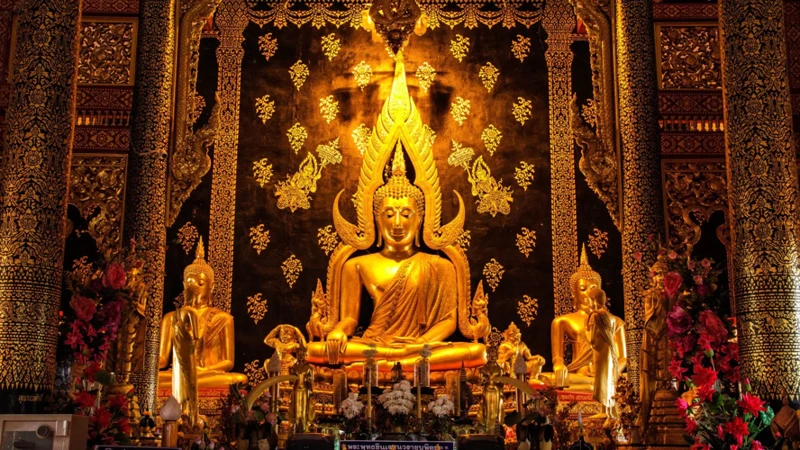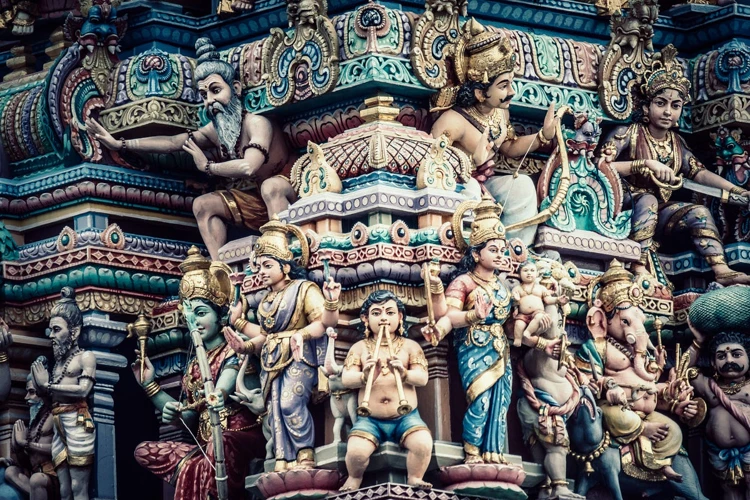Contents
- The Concept of Dharma in Hindu Mythology: A Path to Inner Harmony and Social Order
- The Origins of Dharma
- Interpreting Dharma
- Principles of Dharma
- Dharma in Mythological Stories
- Relevance of Dharma Today
- Conclusion
-
Frequently Asked Questions
- What is the role of Dharma in Hindu mythology?
- Are there different interpretations of Dharma?
- How does Karma influence Dharma?
- What are some key principles of Dharma?
- What is the relevance of Dharma in today’s world?
- How is Dharma depicted in the story of Ramayana?
- What role does Dharma play in the Mahabharata and Bhagavad Gita?
- How does Dharma impact personal life?
- What is the connection between Dharma and social responsibility?
- How does Dharma relate to environmental stewardship?
- References
-
Frequently Asked Questions
- FAQ 1: What does the concept of Dharma mean in Hindu mythology?
- FAQ 2: How is Dharma linked to the Vedas?
- FAQ 3: Are there different interpretations of Dharma?
- FAQ 4: How does Karma influence the concept of Dharma?
- FAQ 5: What are some fundamental principles of Dharma?
- FAQ 6: How is Dharma depicted in the story of Ramayana?
- FAQ 7: What role does Dharma play in the Mahabharata and Bhagavad Gita?
- FAQ 8: How is Dharma relevant in today’s world?
- FAQ 9: Can one’s Dharma change over time?
- FAQ 10: Is Dharma applicable only to Hindus?
- References
- Read More

In the vibrant tapestry of Hindu mythology, dharma emerges as a profound and intricate concept. It encompasses a wide range of meanings, including duty, righteousness, and cosmic law. Dharma provides a framework for ethical and moral behavior, serving as a guiding light for individuals and society as a whole. Through the exploration of ancient texts and mythological stories, we can uncover the origins of dharma, its principles, and its relevance in today’s world. Join us as we delve into the depths of Hindu mythology, unveiling the concept of dharma and its transformative power in fostering inner harmony and social order.
The Origins of Dharma

In the realm of Hindu mythology, the origins of dharma can be traced back to the sacred texts known as the Vedas. These ancient scriptures, composed thousands of years ago, serve as the foundation upon which Hinduism is built. Within the Vedas, dharma is presented as a cosmic principle that upholds the natural order of the universe. It is believed to have been established by the divine forces and serves as a guiding force for individuals to fulfill their moral and societal duties. Additionally, dharma finds its expression in the epic narratives such as the Ramayana and the Mahabharata, where it is showcased through the actions and dilemmas faced by the legendary characters. By scrutinizing these mythological stories, we can gain a deeper understanding of the significance of dharma and its immense impact on shaping Hindu thought and philosophy throughout the ages.
The Vedas and Dharma
The Vedas, the ancient scriptures in Hindu mythology, play a pivotal role in shaping the concept of dharma. These texts are revered as the oldest sacred texts in Hinduism and are believed to have been divinely revealed to enlightened sages. Within the Vedas, dharma is described as a fundamental cosmic principle that governs the natural order of the universe. It is presented as a moral and ethical code that individuals must adhere to in order to maintain balance and harmony in society. The Rigveda, one of the four Vedas, contains hymns and verses that provide insights into the nature of dharma and emphasize its importance in righteous living. The Yajurveda offers guidelines for performing rituals and sacrifices in accordance with one’s dharma and highlights the role of spirituality in upholding moral values. The Samaveda and Atharvaveda also contain teachings on dharma, emphasizing the importance of truth, justice, and social responsibility. The Vedas serve as a rich source of knowledge and wisdom, providing a deep understanding of the significance of dharma in Hindu mythology and its relevance in leading a righteous and purposeful life.
The Role of Dharma in the Epics
The epics, such as the Ramayana and the Mahabharata, play a significant role in showcasing the profound concept of dharma in Hindu mythology. These epic narratives bring forth dilemmas faced by their legendary characters, presenting complex moral and ethical choices that highlight the importance of dharma in guiding one’s actions. In the Ramayana, Lord Rama is depicted as the epitome of righteousness, upholding dharma as he embarks on a journey to rescue his wife, Sita, from the clutches of the demon king, Ravana. Rama’s adherence to dharma is evident throughout the epic, showing unwavering loyalty to his dharma as a prince, a husband, and a righteous figure. Similarly, in the Mahabharata, the concept of dharma takes center stage during the Kurukshetra war, where the Kauravas and Pandavas are entangled in a battle for power and justice. The character of Arjuna, faced with the moral dilemma of fighting against his own relatives and loved ones, seeks guidance from Lord Krishna in the Bhagavad Gita. The teachings of Lord Krishna in the Gita emphasize the significance of fulfilling one’s dharma without attachment to outcomes, emphasizing duty over personal desires. These epic tales serve as powerful narratives that demonstrate the complexities and challenges of navigating dharma in various life situations, providing valuable insights and lessons that continue to resonate today.
Interpreting Dharma

Interpreting dharma in Hindu mythology involves embracing the diverse schools of thought that have emerged throughout history. These different philosophical perspectives offer unique insights into the concept of dharma and its practical application in everyday life. One school of thought emphasizes the importance of fulfilling one’s duties and responsibilities without attachment to the outcomes – a path known as Karma Yoga. Another perspective highlights the pursuit of knowledge and self-realization, known as Jnana Yoga. Additionally, the influence of karma, the law of cause and effect, plays a crucial role in understanding dharma. The actions and intentions of individuals determine their future consequences, both in this life and the next. By exploring these various interpretations and recognizing their interconnectedness, we can gain a deeper understanding of dharma and its profound significance in Hindu mythology.
Various Schools of Thought
Various schools of thought emerged within the realm of dharma, each offering its own interpretation and understanding of this fundamental concept in Hindu mythology. These different philosophical perspectives have sparked intellectual debates and discussions for centuries, enriching the tapestry of Hindu thought. One prominent school of thought is the Mimamsa, which emphasizes the performance of rituals and adherence to Vedic injunctions as the primary means of upholding dharma. Another significant school is Vedanta, which delves into the metaphysical aspects of dharma and seeks to understand the true nature of reality. The Yoga school puts emphasis on self-discipline and spiritual practices to attain enlightenment and align oneself with dharma. The Nyaya school employs logical reasoning to explore the principles of dharma, while the Sankhya school analyzes the nature of the self and its relationship to dharma. These diverse schools of thought offer nuanced perspectives on dharma, adding depth and richness to the understanding of this profound concept. Through the exploration of these different philosophical approaches, individuals can find a path that resonates with their own spiritual journey and quest for living in harmony with cosmic principles.
The Influence of Karma
The concept of karma is intricately linked to the understanding and interpretation of dharma in Hindu mythology. Karma refers to the law of cause and effect, where one’s actions have consequences that shape their present and future experiences. It is believed that every action, whether good or bad, generates a karmic reaction that determines the course of one’s life. This belief in karma reinforces the importance of following dharma in one’s actions, as it influences the karmic outcomes. By adhering to one’s duties and righteous behavior according to dharma, individuals can accumulate positive karma and ultimately progress on the path to spiritual liberation. Conversely, neglecting one’s dharma or engaging in unethical behavior can lead to negative karma and its subsequent repercussions. The influence of karma serves as a moral compass, encouraging individuals to take responsibility for their actions and make choices that align with their sense of dharma. By understanding the profound connection between dharma and karma, individuals can navigate their lives with greater awareness and strive towards personal growth and spiritual evolution.
Principles of Dharma

The principles of dharma encompass a set of values and virtues that guide individuals towards leading a righteous and harmonious life. These principles are deeply rooted in Hindu mythology and philosophy, offering a moral compass for navigating the complexities of existence. One of the fundamental principles is ahimsa, which advocates for non-violence and compassion towards all living beings. Satyam, the principle of truthfulness, emphasizes the importance of honesty and integrity in one’s words and actions. Asteya promotes non-stealing, encouraging individuals to practice honesty and refrain from taking what is not rightfully theirs. Brahmacharya, or self-control, focuses on discipline and moderation in all aspects of life. Aparigraha urges individuals to let go of possessiveness and cultivate detachment. Other principles include daya (compassion), kshaama (forgiveness), and dharma as a social responsibility. By embodying these principles, individuals can attain personal growth, contribute to society’s well-being, and establish a harmonious cosmic connection.
Ahimsa (Non-violence)
In Hindu mythology, Ahimsa is a fundamental principle that advocates for non-violence in all aspects of life. Derived from the Sanskrit word “ahimsa,” which means “non-injury” or “non-harming,” this concept forms the cornerstone of ethical behavior and spiritual practice. Ahimsa encourages individuals to refrain from causing harm or pain to any living being, both physically and mentally. The principle of ahimsa is deeply rooted in the belief of the interconnectedness of all beings and the belief in the sanctity of life. It embodies the idea that violence begets violence and that by practicing ahimsa, one can contribute to the creation of a harmonious and peaceful world. This principle is exemplified in the life of Mahatma Gandhi, who led the Indian independence movement with a steadfast commitment to non-violence. His philosophy of non-violent resistance, known as Satyagraha, influenced countless individuals and continues to inspire movements for justice and peace worldwide. By embracing ahimsa, individuals can strive to foster compassion, understanding, and respect for all living beings, thus promoting harmony and unity in the world.
Satyam (Truthfulness)
Satyam, meaning truthfulness, holds a significant place in the concept of dharma in Hindu mythology. Truthfulness is seen as an essential virtue in leading a righteous and ethical life. According to Hindu scriptures, satyam is not just about speaking the truth but also entails aligning one’s thoughts, actions, and intentions with truth. It emphasizes the importance of honesty, integrity, and sincerity in all aspects of life. Adhering to the principle of satyam, individuals are encouraged to be truthful not only to others but also to themselves. This includes being truthful in relationships, in fulfilling responsibilities, and in upholding one’s commitments. The practice of satyam cultivates trust, fosters harmonious interactions, and promotes transparency in both personal and societal realms. It is believed that embracing satyam leads to self-realization and attaining higher spiritual truths. In mythological stories, the characters who embody this virtue are celebrated for their unwavering commitment to truth, even in the face of adversities. By upholding the principle of satyam, individuals contribute to the maintenance of social order, ethical conduct, and the overall well-being of society. To truly understand and appreciate the depth of satyam, it is crucial to cultivate a sense of introspection, self-awareness, and a commitment to honesty in thought, word, and action.
Asteya (Non-stealing)
Asteya, one of the principles of dharma, encapsulates the essence of non-stealing and refraining from taking what is not rightfully earned. This principle extends beyond the act of literal theft and encompasses a broader perspective on personal integrity and ethical conduct. In Hindu mythology, the concept of Asteya encourages individuals to cultivate a mindset of contentment and gratitude for what they have, rather than coveting what belongs to others. It emphasizes the importance of honest labor and fair exchange in one’s interactions with the world. Asteya teaches us to respect the property, time, and ideas of others, recognizing that every individual has the right to their possessions and the fruit of their efforts. By practicing Asteya, individuals can create an atmosphere of trust and harmony, fostering a more equitable and just society. This concept serves as a reminder that true fulfillment and prosperity arise not from taking what belongs to others, but from nurturing our own talents and being satisfied with what life offers us. By embodying Asteya in our actions, we contribute to the preservation of social order and uphold the values of integrity and respect for one another without resorting to theft or dishonest practices. The principle of Asteya encourages us to explore ways to be self-sufficient, collaborative, and mutually supportive, fostering a society where everyone can thrive and contribute their unique gifts.
Brahmacharya (Self-control)
In the realm of Brahmacharya, self-control takes center stage as a fundamental principle within the concept of dharma. It advocates for the mastery of one’s senses, desires, and impulses in order to lead a disciplined and purposeful life. Brahmacharya often pertains to celibacy, particularly in the context of spiritual practices and the pursuit of enlightenment. However, it extends beyond mere abstinence from physical pleasure and encompasses a broader understanding of restraint and moderation in all aspects of life. It encourages individuals to channel their energy towards higher goals, intellectual pursuits, and spiritual growth. By cultivating self-control, one gains the ability to harness their desires and passions, leading to greater clarity of mind and a deeper connection with one’s true self. This principle of Brahmacharya serves as a guiding force, urging individuals to strike a balance between indulgence and restraint, ultimately fostering personal growth and inner harmony. To explore further the connection between astrological compatibility and relationships, you can read about astro sign compatibility and discover how cosmic alignments influence interpersonal dynamics.
Aparigraha (Non-possession)
Aparigraha, a fundamental principle of dharma, emphasizes the practice of non-possession and detachment. It calls individuals to cultivate a mindset of letting go of material attachments and desires. In Hindu mythology, the concept of aparigraha is exemplified by the notion that true wealth lies not in material possessions but in spiritual enlightenment and inner contentment. By relinquishing the grasping of objects, power, and wealth, individuals can free themselves from the cycle of attachment and suffering. Aparigraha encourages individuals to lead a simple and modest life, devoid of excessive accumulation of material goods. This principle also fosters gratitude for what one already possesses and promotes a sense of interconnectedness with others and the world around them. Practice of aparigraha can lead to a profound transformation, allowing individuals to focus on inner growth, self-realization, and spiritual enlightenment. It enables them to break free from the bondage of materialism and find true fulfillment in seeking higher truths and deeper connections with the divine and the cosmos. Through the practice of aparigraha, individuals can attain a sense of liberation and transcend the limitations imposed by the material world, opening up pathways to profound spiritual experiences and self-discovery.
Daya (Compassion)
Compassion, or Daya, is a fundamental principle within the concept of dharma in Hindu mythology. It is rooted in the understanding and empathy for the suffering of others and extends to all living beings, as well as the environment. Daya encourages individuals to cultivate a sense of deep compassion and kindness towards others, regardless of their differences. This principle highlights the interconnectedness of all beings and the idea that by alleviating the pain and suffering of others, one contributes to the overall harmony of the world.
In Hindu mythological stories, Daya is often portrayed through the actions of divine beings, sages, and enlightened individuals. For example, in the epic Mahabharata, the character of Lord Krishna demonstrates compassion towards all, irrespective of their past actions or social backgrounds. He advises Arjuna to approach the battle with love and compassion, emphasizing the importance of understanding and empathizing with the opposing forces, rather than succumbing to hatred or violence. This narrative conveys the message that Daya is not just a personal virtue but a guiding principle that can lead to personal growth and spiritual enlightenment.
In practical terms, Daya calls upon individuals to actively engage in acts of kindness and service towards others. It encourages the practice of altruism, helping those in need, and promoting social justice. By embracing Daya as an integral part of one’s life, individuals can foster a more harmonious and compassionate society.
Ultimately, Daya serves as a reminder that compassion is not just an external act but also an internal state of being. It invites individuals to cultivate a compassionate mindset, extending kindness and understanding towards oneself as well. By integrating Daya into our lives, we can contribute to the overall well-being of humanity and create a more compassionate and empathetic world.
[For more information on cosmic connections between Aquarius and Libra compatibility, click here.](/cosmic-connection-aquarius-libra-compatibility/)
Kshaama (Forgiveness)
In the profound concept of Kshaama within the realm of dharma in Hindu mythology, forgiveness plays a pivotal role in fostering harmony and healing. It is the act of letting go of resentment, anger, and the desire for revenge towards those who have wronged us. Kshaama teaches us that forgiveness is not about condoning or forgetting the misdeeds, but rather about releasing ourselves from the burden of negativity and embracing compassion and empathy. It is through forgiveness that we free ourselves from the cycle of grudges and resentments, allowing for personal growth and inner transformation. In Hindu mythology, we encounter numerous stories where forgiveness is highlighted. The tale of Lord Rama forgiving Ravana, the demon king who abducted his wife, Sita, exemplifies the power of Kshaama. Despite the immense pain and suffering Rama endured, he chose forgiveness as a means to transcend hatred and ultimately bring about reconciliation. The practice of Kshaama not only brings peace to individuals but also plays a vital role in societal harmony, promoting unity and understanding among communities. By embracing forgiveness, we can heal wounds, mend relationships, and cultivate a compassionate society that thrives on empathy and forgiveness.
In Hindu mythology, the concept of dharma goes beyond individual ethical conduct and extends to the broader realm of social responsibility. It emphasizes the importance of individuals fulfilling their duties and obligations towards society as a whole. Dharma encourages people to contribute to the betterment of society and promote harmony and well-being for all.
To understand the connection between dharma and social responsibility, let’s explore some key aspects:
- Role-based Duties: In Hindu society, individuals are assigned specific social roles and responsibilities based on their varna (occupation) and ashrama (stage in life). These roles, such as that of a ruler, teacher, or merchant, come with inherent duties and obligations. Fulfilling these duties with integrity and dedication is seen as an essential part of one’s dharma and contributes to the smooth functioning of society.
- Importance of Service: Service to others, known as seva, is highly valued in Hindu mythology. It is seen as a means to express one’s dharma and make a positive impact on society. Through acts of kindness, charity, and selfless service, individuals can fulfill their social responsibilities and contribute to the welfare of others.
- Respect for Elders: Hindu mythology places great importance on showing respect and reverence to elders and ancestors. This includes caring for aging parents, seeking guidance from wise elders, and preserving cultural heritage. Respecting and honoring the wisdom and experience of the older generation is considered an integral part of one’s dharma and contributes to a harmonious and cohesive society.
- Environmental Stewardship: Hindu mythology acknowledges the interconnectedness of all living beings and the earth. It emphasizes the need for responsible and sustainable living, emphasizing that humans have a duty to protect and preserve the environment. This aspect of dharma highlights the importance of practicing environmental stewardship and promoting ecological balance for the well-being of present and future generations.
By recognizing the link between individual dharma and social responsibility, Hindu mythology encourages individuals to actively participate in creating a just and equitable society. It highlights the significance of selflessly serving others, fulfilling social roles, respecting elders, and safeguarding the environment as essential components of a harmonious and responsible communal existence.
Dharma in Mythological Stories

Mythological stories in Hinduism provide rich and vibrant portrayals of dharma. One such story is that of the epic Ramayana, which showcases the unwavering commitment to dharma demonstrated by Lord Rama. Despite facing numerous challenges and temptations, Rama upholds his sense of duty and righteousness, ultimately serving as a role model for the preservation of dharma. Similarly, the Mahabharata and the Bhagavad Gita present a profound exploration of dharma. The conflict between the Pandavas and the Kauravas serves as a backdrop for the philosophical teachings in the Bhagavad Gita. Lord Krishna imparts wisdom to Arjuna, emphasizing the importance of fulfilling one’s duties in line with dharma. The stories’ intricate character development and moral dilemmas provide a glimpse into the complexities of dharma and offer valuable insights into its significance in leading a righteous and balanced life.
The Story of Ramayana
The story of Ramayana, a revered epic in Hindu mythology, holds a prominent place in the exploration of dharma. The tale revolves around the life of Prince Rama, an embodiment of righteousness and virtue. Rama is depicted as the epitome of dharma, adhering to his duties and moral obligations despite the numerous trials and tribulations he encounters throughout his journey. He exemplifies the principles of ahimsa (non-violence), satyam (truthfulness), and daya (compassion) in his interactions with others, reinforcing the importance of these values in leading a righteous and purposeful life. The story also highlights the dilemmas faced by various characters and their struggle in upholding their own dharma. For example, Rama’s wife, Sita, faces an arduous test of dharma when she is abducted by the demon king Ravana. Despite being subjected to immense suffering, she remains steadfast in her principles and remains loyal to her husband. The Ramayana serves as a moral compass, illustrating the significance of dharma and the ultimate triumph of good over evil. It serves as an inspiration for individuals to follow the path of righteousness, integrity, and selflessness in their own lives, finding solace and guidance in the timeless lessons embedded within this remarkable mythological tale.
The Mahabharata and Bhagavad Gita
The Mahabharata, an epic tale of power, duty, and honor, contains within its vast narrative the essence of dharma and its complexities. At the heart of the Mahabharata lies the philosophical discourse known as the Bhagavad Gita, which serves as a profound guide to righteous living and the pursuit of dharma. The Bhagavad Gita is a conversation between Prince Arjuna and Lord Krishna, where Arjuna finds himself in a moral dilemma on the battlefield, torn between his duty as a warrior and his compassion for his own family members who stand on the opposing side. Lord Krishna imparts divine wisdom to Arjuna, emphasizing the importance of fulfilling one’s duties according to their dharma. He implores Arjuna to rise above his personal attachments and desires, advocating for selflessness, spiritual discipline, and devotion to a higher purpose. The Bhagavad Gita teaches that one must embrace their responsibilities and actions without attachment to the outcomes, acknowledging the transient nature of life. It emphasizes the significance of understanding one’s own nature and role in the grand tapestry of existence, and the importance of adhering to one’s dharma with unwavering commitment. The Mahabharata and the Bhagavad Gita continue to inspire seekers of wisdom and provide profound insights into the intricacies of dharma and the eternal quest for self-realization.
Relevance of Dharma Today

In the ever-evolving world of today, the concept of dharma continues to hold immense relevance and significance. It serves as a guiding light for individuals, providing a moral compass in navigating the complexities of life. Dharma fosters a sense of personal responsibility, encouraging individuals to lead lives of integrity, honesty, and compassion. Furthermore, dharma extends beyond the individual and permeates into society, emphasizing the importance of social responsibility and justice. By upholding dharma in personal life, individuals contribute to the collective well-being and harmony of society. Additionally, dharma plays a crucial role in environmental stewardship, emphasizing the need for humans to honor and respect the natural world. In a time of rapid change and uncertainty, the timeless principles of dharma offer a moral framework and a path towards a more just, harmonious, and sustainable future.
Dharma in Personal Life
When it comes to personal life, the concept of dharma holds immense significance in Hindu mythology. It serves as a moral compass, guiding individuals to lead a righteous and purposeful existence. Here are some key aspects of dharma in personal life:
- Svadharma (Individual Duty): Each person has a unique set of responsibilities and obligations based on their role in society. Fulfilling these duties with dedication and integrity is considered essential in leading a fulfilling life.
- Self-Realization: Dharma encourages individuals to explore their true nature and purpose. By understanding one’s strengths, weaknesses, and interests, individuals can align their actions with their inner calling, fostering self-fulfillment.
- Adherence to Moral Values: Dharma emphasizes the practice of virtues such as honesty, respect, compassion, and humility. Integrating these values into daily life cultivates a sense of integrity and ethical behavior.
- Balancing Individual and Social Obligations: While personal desires and ambitions are important, dharma reminds individuals of their responsibility towards the larger society. Striking a balance between personal aspirations and societal well-being ensures harmony and social cohesion.
- Seeking Inner Harmony: Dharma encourages individuals to cultivate inner peace and harmony through practices such as meditation, self-reflection, and self-discipline. By nurturing a connection with the divine and maintaining a balanced state of mind, individuals can lead a more fulfilling life.
By embracing dharma in their personal lives, individuals strive towards self-improvement, moral righteousness, and spiritual growth. It creates a sense of purpose, harmony, and balance, allowing individuals to navigate the complexities of life with clarity and conviction.
Dharma in Society
In Hindu mythology, dharma plays a vital role in shaping and maintaining a harmonious society. It provides a moral and ethical framework that guides individuals and communities towards righteous actions and social responsibility. Here are some key aspects of dharma in society:
- Justice and Fairness: Dharma emphasizes the importance of justice and fairness in society. It teaches individuals to treat others with respect, equality, and impartiality. Upholding principles of fairness ensures social harmony and prevents the exploitation or oppression of marginalized sections of society.
- Humanitarian Values: Dharma emphasizes compassion, empathy, and concern for the welfare of others. It encourages individuals to extend support and help those in need, fostering a sense of unity and community.
- Social Roles and Responsibilities: Dharma in society highlights the significance of fulfilling one’s social roles and responsibilities. It underscores the idea that each individual has specific duties towards their family, community, and society at large. By fulfilling these roles, individuals contribute to the overall welfare and harmony of society.
- Environmental Stewardship: Dharma also extends to the preservation and protection of the environment. It emphasizes the importance of living in harmony with nature, promoting sustainable practices, and respecting the interconnectedness of all living beings.
- Promotion of Virtuous Qualities: Dharma encourages the cultivation of virtuous qualities such as honesty, integrity, and self-discipline. These values form the bedrock of a healthy and prosperous society, fostering trust, cooperation, and mutual respect among its members.
- Respect for Elders and Ancestors: Dharma emphasizes reverence and respect for elders and ancestors. It encourages younger generations to learn from their wisdom, seek their guidance, and carry forward the traditions and values in the societal fabric.
- Community Service: Dharma encourages individuals to engage in selfless service for the betterment of society. Through acts of kindness, charity, and volunteering, individuals embody the spirit of dharma and contribute to the overall welfare and upliftment of the community.
By embracing dharma in society, individuals can transform their actions into acts of service, kindness, and moral integrity. This fosters a sense of collective well-being and ensures a harmonious and balanced society in accordance with the principles of Hindu mythology.
Dharma in Environmental Stewardship
In Hindu mythology, the concept of dharma extends to the realm of environmental stewardship, emphasizing the sacred duty to protect and preserve the natural world. This aspect of dharma recognizes the intricate interconnectedness between humans, nature, and the divine. It encourages individuals to live in harmony with the environment, acknowledging the inherent divinity present in every living being and the natural elements.
According to Hindu belief, the Earth is considered a manifestation of the divine goddess, and all living creatures are interconnected in a cosmic web of existence. This understanding instills a sense of reverence and respect for nature, promoting a responsible and sustainable approach to environmental stewardship.
The principles of dharma guide individuals to practice ahimsa (non-violence) towards all living beings, including animals, plants, and ecosystems. It encourages the cultivation of compassion and empathy towards nature, fostering a deep sense of interconnectedness and a duty to protect and preserve the environment for future generations.
In Hindu mythology, various deities and mythological stories highlight the importance of environmental conservation. For example, Lord Krishna, a central figure in the Bhagavad Gita, emphasizes the need for harmony and balance in the treatment of nature. He advocates for a responsible and mindful use of resources, valuing sustainability and avoiding wastefulness.
The concept of dharma in environmental stewardship encourages individuals to adopt sustainable practices such as conserving water, reducing waste, practicing organic and ethical farming, and supporting biodiversity. It also promotes the understanding that humans are not separate from nature but are an integral part of it, and therefore have a role to play in its preservation.
In today’s world, the relevance of dharma in environmental stewardship is more important than ever. The escalating environmental challenges, such as climate change, deforestation, and pollution, call for a collective effort to restore the balance and heal the planet. Applying the principles of dharma in environmental stewardship can lead to a more sustainable and harmonious coexistence with nature, ensuring a healthier and more prosperous future for all living beings.
Conclusion

In the realm of Hindu mythology, the concept of dharma holds immense significance as a guiding principle for individuals and society. It emphasizes the importance of fulfilling one’s duties, upholding righteousness, and maintaining balance in life. Through the exploration of ancient texts, such as the Vedas, and the examination of mythological stories, such as the Ramayana and the Mahabharata, we can gain profound insights into the essence of dharma and its relevance in our lives today.
The principles of dharma, including ahimsa (non-violence), satyam (truthfulness), asteya (non-stealing), brahmacharya (self-control), aparigraha (non-possession), daya (compassion), kshaama (forgiveness), and the fulfillment of social responsibilities, provide a framework for ethical conduct and harmonious coexistence with others.
Moreover, the concept of dharma extends beyond personal life, as it encompasses societal and environmental stewardship. Upholding dharma in our interactions with others, promoting justice and fairness, and being responsible caretakers of our natural surroundings are essential aspects of dharma in daily life.
While the interpretation and application of dharma may vary among individuals and across different schools of thought, the core values of compassion, righteousness, and duty remain central.
In our modern world, where harmony and social order are often challenged, the concept of dharma offers profound wisdom and guidance. By embracing the principles of dharma and incorporating them into our lives, we can cultivate inner peace, foster harmonious relationships, and contribute to a just and sustainable society. As we navigate our journey in this vast universe, remembering the ancient wisdom of dharma can provide us with a compass, leading us towards a life of purpose, integrity, and spiritual fulfillment.
Frequently Asked Questions

What is the role of Dharma in Hindu mythology?
Dharma plays a crucial role in Hindu mythology as it serves as a moral and ethical compass for individuals and society. It guides individuals in making righteous choices and establishes the framework for maintaining order and harmony in the world.
Are there different interpretations of Dharma?
Yes, there are various schools of thought and interpretations of Dharma within Hindu mythology. Different philosophical traditions may emphasize different aspects of Dharma, leading to diverse perspectives on its meaning and application.
How does Karma influence Dharma?
Karma, the law of cause and effect, is closely intertwined with Dharma. It suggests that our actions have consequences and that adhering to Dharma leads to positive Karma, while straying from it leads to negative Karma.
What are some key principles of Dharma?
Some key principles of Dharma include Ahimsa (non-violence), Satyam (truthfulness), Asteya (non-stealing), Brahmacharya (self-control), Aparigraha (non-possession), Daya (compassion), and Kshaama (forgiveness). These principles guide individuals towards leading virtuous lives.
What is the relevance of Dharma in today’s world?
Dharma remains relevant in today’s world as it provides a moral compass for individuals, helping them navigate complex ethical dilemmas. It also promotes a sense of social responsibility, harmony, and environmental stewardship.
How is Dharma depicted in the story of Ramayana?
In the epic tale of Ramayana, Dharma is portrayed through the actions of the hero, Lord Rama. He adheres to his righteous duties and upholds Dharma, even in the face of adversity, setting an example of moral integrity.
What role does Dharma play in the Mahabharata and Bhagavad Gita?
The Mahabharata and Bhagavad Gita delve deep into the complexities of Dharma through the dilemmas faced by the characters. The Bhagavad Gita, in particular, explores the concept of duty and righteousness, providing guidance on how to live a Dharmic life.
How does Dharma impact personal life?
Dharma provides individuals with a moral compass, guiding their actions and decisions in personal life. It helps individuals lead a life of integrity, honesty, and compassion, promoting personal growth and spiritual well-being.
Dharma and social responsibility are intertwined. Dharma emphasizes the importance of fulfilling one’s societal roles and responsibilities, contributing to the greater welfare of the community and fostering social harmony.
How does Dharma relate to environmental stewardship?
Dharma encourages individuals to act as responsible stewards of the environment. It promotes sustainable practices, respect for nature, and the understanding that we are interconnected with the natural world.
References
Frequently Asked Questions

FAQ 1: What does the concept of Dharma mean in Hindu mythology?
In Hindu mythology, Dharma refers to the moral and ethical principles that govern individual actions, social conduct, and cosmic order. It is the duty and responsibility to maintain righteousness and uphold the balance of the universe.
FAQ 2: How is Dharma linked to the Vedas?
The Vedas, the ancient sacred texts of Hinduism, provide the foundation for the concept of Dharma. They contain hymns, rituals, and guidelines that emphasize the importance of living in accordance with Dharma.
FAQ 3: Are there different interpretations of Dharma?
Yes, there are various schools of thought within Hinduism that interpret Dharma differently. Each school emphasizes different aspects, but they all agree on the core principles of righteousness, duty, and moral conduct.
FAQ 4: How does Karma influence the concept of Dharma?
Karma, the law of cause and effect, is closely interlinked with Dharma. It is believed that one’s actions and behavior, as guided by Dharma, determine their future consequences in the cycle of birth, death, and rebirth.
FAQ 5: What are some fundamental principles of Dharma?
Some fundamental principles of Dharma include Ahimsa (non-violence), Satyam (truthfulness), Asteya (non-stealing), Brahmacharya (self-control), Aparigraha (non-possession), Daya (compassion), Kshaama (forgiveness), and the fulfillment of social responsibilities.
FAQ 6: How is Dharma depicted in the story of Ramayana?
In the epic tale of Ramayana, Lord Rama exemplifies the embodiment of righteous conduct and adherence to Dharma. His unwavering commitment to fulfilling his duties as a prince, husband, and ruler showcases the importance of Dharma in one’s life.
FAQ 7: What role does Dharma play in the Mahabharata and Bhagavad Gita?
The Mahabharata and the Bhagavad Gita explore the complexities of Dharma in difficult situations. The Bhagavad Gita, in particular, delves into the concept of duty and moral responsibility, teaching that fulfilling one’s Dharma is essential regardless of the circumstances.
FAQ 8: How is Dharma relevant in today’s world?
Dharma continues to hold significance in contemporary times. It guides individuals to make ethical decisions, promotes social harmony and responsibility, and encourages environmental stewardship for the well-being of future generations.
FAQ 9: Can one’s Dharma change over time?
Yes, one’s Dharma can evolve and change based on life experiences, roles, and stages of life. It is important to adapt to new circumstances while maintaining core values and principles of righteousness.
FAQ 10: Is Dharma applicable only to Hindus?
No, the concept of Dharma extends beyond religious boundaries. Its principles can be applied by individuals from diverse cultural and religious backgrounds as a universal guide for leading a righteous and purposeful life.







